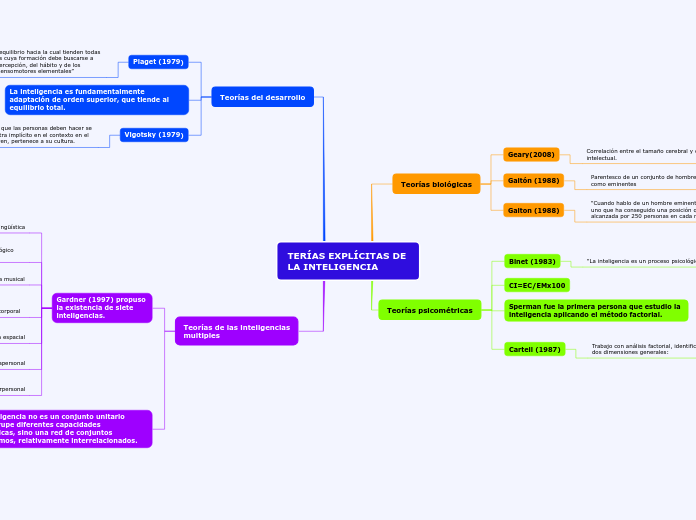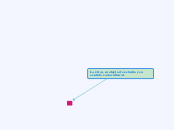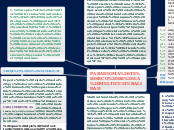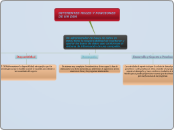TERÍAS EXPLÍCITAS DE
LA INTELIGENCIA
In linguistics, syntax is the set of rules, principles, and processes that govern the structure of sentences in a given language, usually including word order.
Teorías de las inteligencias
multiples
A compound sentence is a sentence that has at least two independent clauses joined by a comma, semicolon or conjunction. An independent clause is a clause that has a subject and verb and forms a complete thought.
La inteligencia no es un conjunto unitario
que agrupe diferentes capacidades
específicas, sino una red de conjuntos autónomos, relativamente interrelacionados.
Create your own compound sentences, using the coordinators above.
Gardner:
El desarrollo de algún tipo de inteligencia depende de tres factores: Factor Biológico, factor de la vida personal y Factores culturales e históricos.
Gardner (1997) propuso
la existencia de siete
inteligencias.
When independent clauses are joined with coordinators (also called coordinating conjunctions), commas and semicolons, they do more than just join the clauses. They add meaning and flow to your writing.
Inteligencia interpersonal
Capacidad para comprender el actuar de
los demás.
Inteligencia intrapersonal
Capacidad para comprenderse a sí
mismo.
Inteligencia espacial
Capacidad para reconocer y manipular
pautas en espacios.
Inteligencia
cinestesicocorporal
Utilización del cuerpo, en forma total o
parcial, para resolver problemas y crear
nuevos productos.
Inteligencia musical
Capacidad para interpretar, componer y
apreciar pautas musicales.
Inteligencia lógico
matemática
Capacidad de analizar problemas de
lógica.
Inteligencia lingüística
Capacidad de manejar adecuadamente
el lenguaje hablado y escrito.
Teorías del desarrollo
A complex sentence is a sentence that contains an independent clause and one or more dependent clauses.
An independent clause can stand alone as a sentence, but a dependent clause even though it has a subject and a verb cannot stand alone.
Vigotsky (1979)
An adverbial clause is a group of two or more words that function as an adverb in a sentence.
Todo lo que las personas deben hacer se
encuentra implícito en el contexto en el
cual viven, pertenece a su cultura.
La inteligencia es fundamentalmente adaptación de orden superior, que tiende al equilibrio total.
The subject clause is a dependent clause that acts as a subject.
Piaget (1979)
The object clause is a phrase on which a verb performs an action. It falls at the end of a sentence, and is governed by a verb or a preposition.
“La forma de equilibrio hacia la cual tienden todas
las estructuras cuya formación debe buscarse a
través de la percepción, del hábito y de los
mecanismos sensomotores elementales”
Teorías psicométricas
Cartell (1987)
See the example below and try to create your own simple sentences.
Tim is driving the red car.
Trabajo con análisis factorial, identificó
dos dimensiones generales:
Inteligencia cristalizada
Inteligencia fluida
Sperman fue la primera persona que estudio la inteligencia aplicando el método factorial.
See the example below and try to create your own simple sentences.
Tim is driving the car with his mother.
CI=EC/EMx100
See the example below and try to create your own simple sentences.
Tim is the driver.
Binet (1983)
See the example below and try to create your own simple sentences.
Tim drives.
"La inteligencia es un proceso psicológico medible"
Teorías biológicas
Galton (1988)
Traditional grammar defines the object in a sentence as the entity that is acted upon by the subject.
"Cuando hablo de un hombre eminente quiero decir
uno que ha conseguido una posición que solo es
alcanzada por 250 personas en cada millón de hombres"
The direct object is the receiver of the action mentioned in the sentence.
Galtón (1988)
The predicate of a sentence is the part that modifies the subject in some way. Because the subject is the person, place, or thing that a sentence is about, the predicate must contain a verb explaining what the subject does and can also include a modifier.
Parentesco de un conjunto de hombres, considerados por él como eminentes
Geary(2008)
The subject of a sentence is the person, place, thing, or idea that is doing or being something. You can find the subject of a sentence if you can find the verb.
Ask the question, 'Who or what 'verbs' or 'verbed'?' and the answer to that question is the subject.
Correlación entre el tamaño cerebral y coeficiente
intelectual.









